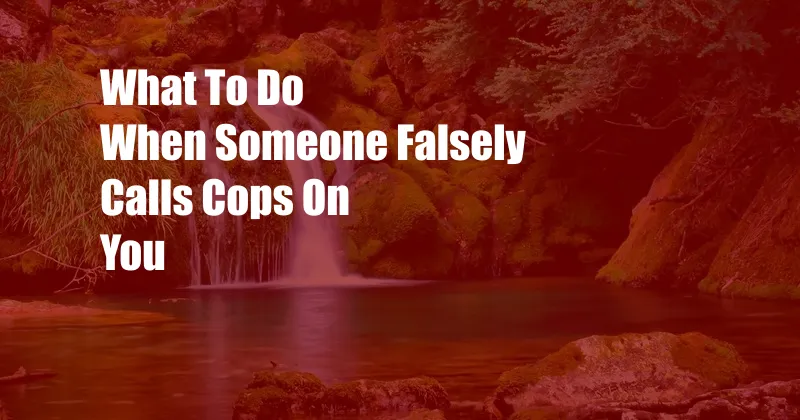
What to Do When Someone Falsely Calls the Cops on You
Imagine this: you’re innocently minding your own business when suddenly, police sirens blare and blue lights flash outside your home. A neighbor has made a false police report, accusing you of a crime you didn’t commit. This scenario, known as “swatting,” has become increasingly common, leaving its victims feeling violated and traumatized.
In the aftermath of such a traumatic event, it’s crucial to understand your rights, protect your safety, and seek justice. Here’s a comprehensive guide to help you navigate this challenging situation.
Understanding Swatting
Swatting is a malicious prank where someone makes a false 911 call, reporting a serious crime at a specific location. The call often involves threats of violence, hostage situations, or other emergencies, prompting a massive police response.
Motives for swatting vary, from revenge to harassment to gaining notoriety online. Victims can be targeted based on their race, religion, gender, or even their social media presence. The consequences can be severe, including psychological trauma, arrest, property damage, and even death.
Protecting Yourself
If you find yourself in a swatting situation, prioritize your safety:
- Stay calm and follow police instructions. Avoid sudden movements or confrontations.
- Explain that the call was false. Inform officers that you’re the victim of swatting and provide any evidence you have.
- Contact a lawyer immediately. They can protect your rights and guide you through the legal process.
Seeking Justice
After ensuring your safety, focus on holding the perpetrator accountable:
- Report the incident to local law enforcement. File a police report and provide as much information as possible.
- Contact your local FBI office. Swatting is a federal crime, and the FBI has jurisdiction to investigate these cases.
- Consider civil action. You may be entitled to compensation for the damages you’ve suffered as a result of the false report.
Latest Trends and Developments
Swatting has evolved in recent years, with perpetrators using technology to conceal their identities:
- Spoofing: Callers use technology to make it appear as if the call is coming from your number.
- Online forums: Swatting can be organized through online forums or social media platforms.
- Revenge swatting: Individuals retaliate against others by making false police reports.
Tips and Expert Advice
To protect yourself from swatting:
- Be aware of your surroundings. Pay attention to any suspicious activity or unfamiliar people in your neighborhood.
- Control your online presence. Avoid posting personal information or sensitive details on social media.
- Educate others. Raise awareness about swatting and its consequences.
If you’re concerned about being swatted, consider taking additional precautions:
- Install security measures. Set up security cameras or home alarms to deter potential swatters.
- Develop a safety plan. Identify safe places to go in case of an emergency.
- Notify law enforcement. Inform your local police department about your concerns and provide them with your contact information.
Frequently Asked Questions
Q: What are the penalties for swatting?
A: Swatting is a serious crime punishable by fines, imprisonment, or both.
Q: What should you do if you receive a swatting threat?
A: Contact your local law enforcement immediately and provide them with the details of the threat.
Conclusion
Swatting is a dangerous and malicious crime that can have devastating consequences. By understanding your rights, protecting your safety, and seeking justice, you can combat this threat and hold perpetrators accountable. Remember, you are not alone. If you’ve been swatted, don’t hesitate to reach out for help.
Are you interested in learning more about swatting and its prevention?